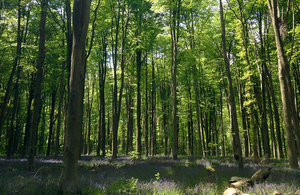HS2 Ltd's approach to ancient woodlands during the Oakervee Review
As highlighted by the Secretary of State, during the Oakervee Review we must strike a sensible balance between keeping the programme on track, and recognising that some works cannot be undone.

We have assessed 11 ancient woodlands, parts of which were due to be affected by preparations for HS2 this autumn. We can confirm that work will be deferred on all 11 sites until the Oakervee Review is concluded.
We have assessed 11 ancient woodlands, parts of which were due to be affected by preparations to build Britain’s new high speed railway this autumn, during the period of the Oakervee review. Work will now be deferred to Autumn or Winter 2020 on 5 of these sites, and to early 2020 on 6 of the sites. We will also take measures to protect wildlife to ensure they are not affected when work begins in early 2020.
The work affecting 11 ancient woodlands will be deferred as follows:
Five sites to be deferred to Autumn / Winter 2020
- Roughknowles Wood
- North Wood
- Un-named copse off Drayton Lane
- Rookery Wood
- Burnt Firs
Six sites to be deferred to early 2020
In these locations, we will need to carry out measures to protect wildlife. This will involve some localised removal of selected tree branches for essential protected species mitigation works to meet legal requirements ahead of the works in early 2020. However, we will not remove branches from any ‘ancient’ or ‘veteran’ trees within an ancient woodland so as not to affect the integrity of the ancient woodlands.
- Fulfen Wood
- Broadwells Wood
- Birches Wood
- Crackley Wood
- Unnamed Woodland south of Ashow Road
- South Cubbington Wood
Other essential preparatory works will continue including low level vegetation clearance, fencing and preparation of site accesses.
Of the 52,000 ancient woodland sites in England, 43 will be affected by HS2’s route between London and Crewe, and over 80% of the total area of these 43 will remain intact and untouched by HS2.
HS2 aims to be one of the most environmentally responsible infrastructure projects ever delivered in the UK. It will be a greener way to travel offering some of the lowest carbon emissions per passenger kilometre, significantly less than cars and domestic air travel.
Seven million new trees and shrubs, including over 40 native species, specific to each location will be planted as part of the HS2 programme. The new native woodlands will cover over 9 square kilometres of land.
Over 33 square kilometres of new and existing wildlife habitat – equating to an area the size of 4,600 football pitches will be created. That’s an increase of around 30% compared to what’s there now.
Press and media enquiries
Contact form https://www.hs2.org.uk...
The press and media enquiries line is for accredited journalists only